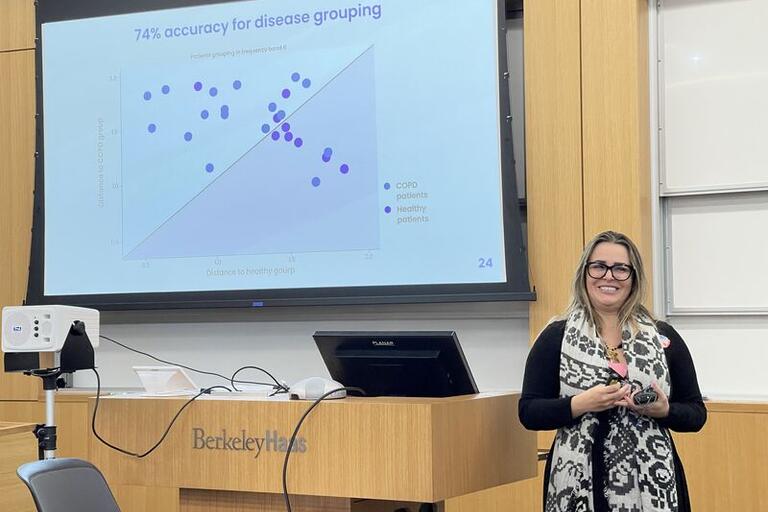Berkeley Changemaker®:Human Health
UGBA13, 2 Units
Spring 2024: Tuesdays 12-2pm, Berkeley Haas, Chou Hall N300
Do you want to make a difference in the lives of others?
Are you wondering how you might be involved?
Find your path with Berkeley Changemaker: Human Health
Brief Description
In this course you will apply the core principles of the Berkeley Changemaker curriculum by:
-
Criticallyexploring a full understanding of an important human health issue,
-
Collaborating with diverse colleagues on a project team to investigate solutions, and
-
Communicating what you’ve learned and providing feedback to your classmates.
Each week you will have a conversation with a Berkeley Human Health Changemaker on a range of topics, and you will update your classmates on the progress of your team’s Area of Interest project.
Enroll here: 2024 Spring UGBA 13 001 LEC 001 | Course Catalog
Full Syllabus, including guest speaker schedule here.
Learning Outcomes
As you engage with this course, you will understand not only the intricacies of your selected Area of Interest, with a deep understanding of the pros and cons of different solutions, and you will also come to understand your own role in making a change in an area of human health. Each week you will not only learn from the guest speakers, but you will also learn from your classmates, and their different Areas of Interest, and benefit from their discoveries and feedback.
Course Format
This course uses two learning methods: weekly conversations with Human Health Changemakers, and a group project exploring an Area of Interest
Weekly Conversations with Human Health Changemakers
We’ll have weekly discussion sessions with either a Near-PeerHuman Health Changemaker (think Forbes 30-under-30 startup founders), or a Human Health Changemaker “Legend” (think Professor Lee Hood, father of the Human Genome Project). There is no specifically assigned reading in this course. Instead, each week you will spend at least an hour researching the week’s guest(s) and list on the Wonder and Surprise sheet:
1. the most useful resource you found for information about the speakers or their companies/organization,
2. two things you have questions about, then
3. after the discussion, two things you were surprised to learn from the discussion.
Group Project exploring an Area of Interest
This course uses a Customer Discovery based learning process. Much of what you discover while working with your project team investigating an Area of Interest will be from one-on-one conversations with people (we call them “interviews” but they don’t need to be that formal). This process is a mindset-changing technique used in courses hosted by the National Institutes of Health, the National Science Foundation, and in the Berkeley Haas School of Business.
Potential Areas of Interest will be suggested and will have a broad scope: from access to healthcare, to cutting-edge therapeutics, diagnostics or scientific tools, to medical economics and policy, to health IT innovations.
Every two weeks your project team will be given a new Focus Topic for your customer discovery research within your Area of Interest. You will brainstorm within your team about hypotheses (ie guesses) relevant to how you might better understand this focus topic. Then you’ll “get out of the building” and learn from conversations with people with an understanding or viewpoint relevant to your hypotheses.
Each team will do several new interviews each week, lasting 10-30 minutes. The expectation for the number of new interviews depends on the team size: four-member teams do four, five-member teams do five, etc.
Then comes the exciting part. Every three weeks your team will present to the rest of the class the results of your interviews:
-
Here’s what we thought… (hypothesis tested)
-
Here’s what we did… (method of testing - what types of questions, how many people you talked to, who were they, what did you generally ask?)
-
What we learned… (summary results - highlighting surprises and key learnings)
-
What we are going to do next… (next steps, follow ups, new tests, pivots, iterations)
Team report-outs are interactive, lively, and involve feedback and questions from your peers via the course Slack channel.
The course will conclude with a final 5-minute presentation highlighting the conversations and learning you and your team had over the course relating to your Area of Interest, highlighting the surprises and “a ha” moments (there are always a few). Final presentations are recorded individually and submitted during finals week.
Prerequisites
No prerequisites other than an interest in learning by listening, and a desire to make a difference in the lives of others. This course complements the Robinson Life Science, Business, and Entrepreneurship Program (LSBE) Introductory Course: Intro to Biotech (MCB c75C / UGBA c95B), and Biotechnology Entrepreneurship: Impact, History, Therapeutics R&D, Entrepreneurship & Careers (BioE 253 / 153) but prior knowledge or experience is not expected or required.
Assessments
As you progress in the course, you’ll be adding questions and revelations to the Wonder and Surprises sheet, and slides to your team’s Area of Interest presentation, culminating in your Final Presentation at the Berkeley Changemaker: Human Health Showcase event.
-
Attendance and Participation (at least one question or feedback to other project teams during their presentations on course Slack channel): 20%
-
Guest Speaker Wonder and Surprise sheet entries: 30%
-
Tri-weekly project team Area of Interest Report-Outs: 25% (focusing on what did you learn from your conversations, and from the interviews your teammates had)
-
Final personal learning synthesis: 25% (submitted presentation synthesizing records of your and your team’s interviews throughout the semester)
Teaching Team
Darren Cooke // Lead Instructor // Executive Director of the Berkeley Life Sciences Entrepreneurship Center and Professional Faculty at the Haas School of Business
Seo Yeon Yoon // Course Reader



